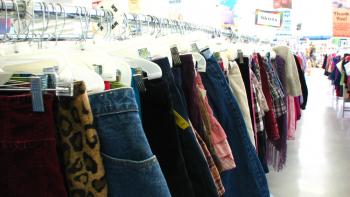 Many domestic violence programs have thrift stores as a source of income. People in the community may donate clothing, home goods, furniture, and other items for resale. These items are resold and in most cases 100 percent of the proceeds generated by the store fund the critical services provided to survivors of domestic violence.
Many domestic violence programs have thrift stores as a source of income. People in the community may donate clothing, home goods, furniture, and other items for resale. These items are resold and in most cases 100 percent of the proceeds generated by the store fund the critical services provided to survivors of domestic violence.
In many cases, families accessing program services can shop for free in the program-run store using a voucher system. Many victims and survivors that seek services from a domestic violence program come to a safe house with only the clothing that they are wearing. The stores provide a dignified option for survivors to select items they prefer in order to start a new life.
1. Fashion Retail
Having experience in fashion retail can be an asset for the domestic violence retail/thrift shop. Volunteers can sort and price donations according to the value of the items. They have a keen eye for brands and are able to identify if an item is in good condition for resale. Volunteers at the store can also help with running the cash register and greeting guests. In addition to assisting clients to find clothing that fits and looks good, volunteers can keep the store organized and stocked. Other responsibilities may include retail sales assistance to customers, set up/take down of merchandise displays and creating, planning, and implementing promotional and sales events.
2. Donations Management
Local domestic violence programs retail/thrift shops receive numerous donated items each day. Volunteers may be in charge of receiving and sorting these donations, assisting with inventory, sorting, laundry, moving, organizing, and stacking donations. These volunteers may also retrieve donations from donors' homes or other pick-up locations. Volunteers responsible for donations management may also run donor drives or other initiatives to promote giving.
3. Seamstress
A person with sewing experience can assist retail/thrift shops in making minor repairs on quality garments such as fixing buttons, seam repair, or other alterations. They can also provide tailoring for garments purchased by the safe house residents in order for them to obtain a proper fit.









